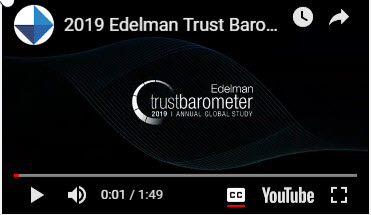The Times (and the Trust) are a’Changin’

As I sat down to write this blog, I didn’t have a starting point. I wasn’t even sure about the topic. But, being good at procrastinating as well as being ready to be distracted, I did a quick scan of some old blogs on the topic that I wanted to address - trust. And, wouldn’t you know, I found a blog I had written some time ago. Although it was 7 years ago, it seemed to hold up and might even more relevant today.
That particular blog was inspired by an article published by the U.S. National Journal entitled In Nothing We Trust.
Although written in 2012, the article presented evidence demonstrating that a trust deficit was building and eating away at the social fabric of American communities. Trusted icons like Walter Cronkite no longer existed in the media and movie stars were failing to inspire. As for politicians, let’s just say it had been noted that integrity and trustworthiness among them was on a downhill slide.
At the time I wrote that blog, I speculated that Canadian research would likely reflect the same findings as more and more people seemed to be losing faith and confidence in their institutions. Additionally, there was a growing belief that government, corporations, the media, organized religion, schools, unions, and financial institutions were letting us down. We did, however, have more trust in non-profit organizations. That too is changing.
Fast forward to 2019 for a change that some will find a tad scary. The recently released Canadian Edelman Trust Barometer revealed critically important changes in the landscape of trust.
As the report clearly conveyed, trust used to be developed from the top down or vertically. Then, about 10 years ago, it started to move to peer to peer or horizontally, as the result of social media.
But, like much else in recent years, everything is constantly changing so now, people are increasingly only trusting that which is very close to them, very local. Turns out those who have been saying, ‘the future is local’ were absolutely right.
Edelman’s Trust Barometer is showing that trust has moved to the employer. ‘My employer’ is actually a 75% trust globally, a phenomenon born of lack of belief in other institutions, together with a deep dissatisfaction with the system, and fears about loss of jobs to automation, or to globalization.
Ultimately this shift in trust is about turning to those who are in close proximity, and, being able to have a voice, be heard, and be able to make a difference in meeting societal needs. It is perhaps also about seeking the reassurance and comfort of community.
This movement really shouldn’t be a surprise. Traditionally, times of social and economic change have always required adaptation.
Think about the stress and the change among our institutions at the turn of the 20th century as we shifted from an agricultural-based economy to the industrial era.
During that time period there was also a loss of faith in institutions as they struggled to respond to powerful capitalists, urban growth, poverty, illiteracy, and the social cost of the modern era.
But, somehow, institutions either adapted or gave way to new ones.
Government helped address social ills, and labour unions helped buttress corporations only focused on profit. When people lost the sense of community they had known in smaller communities as the result of barn-raisings and quilt-making, the growth of fraternal and societal organizations grew substantially.
The challenge today is that we are disappointed as much by the leaders within our institutions as we are with the institutions themselves. Additionally, many are dismayed by both the perceived lack of accountability of those leaders and by the unfairness they fail to stem as the divide between the haves and have-nots continues to grow.

There clearly is a sense that our institutions and their leaders need to change. Even when they are making an effort, they simply aren’t changing fast enough. As a result, government, churches, schools, and other organizations are increasingly being seen ostrich-like or simply irrelevant.
It’s not that people don’t see the value of institutions and structure, it is perhaps more a growing understanding that people who play by the old rules are losing at a new game.
Would it be a big deal to lose our social institutions? What if people did disconnect and turn away from engaging in their communities? After all, many are already losing trust and no longer readily see the value of following the rules of society.
Of course, it would be a big deal.
Strong, safe, and vibrant communities can’t happen if people don’t trust their institutions as much as their employers. When we trust our institutions we’re more likely to vote, volunteer, and take care of one another by working together to tackle the complex challenges that require multifaceted and innovative solutions.
Ultimately that means we all have to work at ensuring we have institutions we can trust.
Each of us can be part of the solution by speaking up and stepping up to ensure that broader citizen-led development in the design of those solutions is made a priority. In other words, we all need to focus on being community builders.
Posted on 08-28-19Next entry: Channel Your Inner Tap Dancer or Work Middle Out?
Previous entry: Want Honey? Plant Flowers!

 Brenda Herchmer is the owner of Grassroots Enterprises, a community development consulting company.
Brenda Herchmer is the owner of Grassroots Enterprises, a community development consulting company.